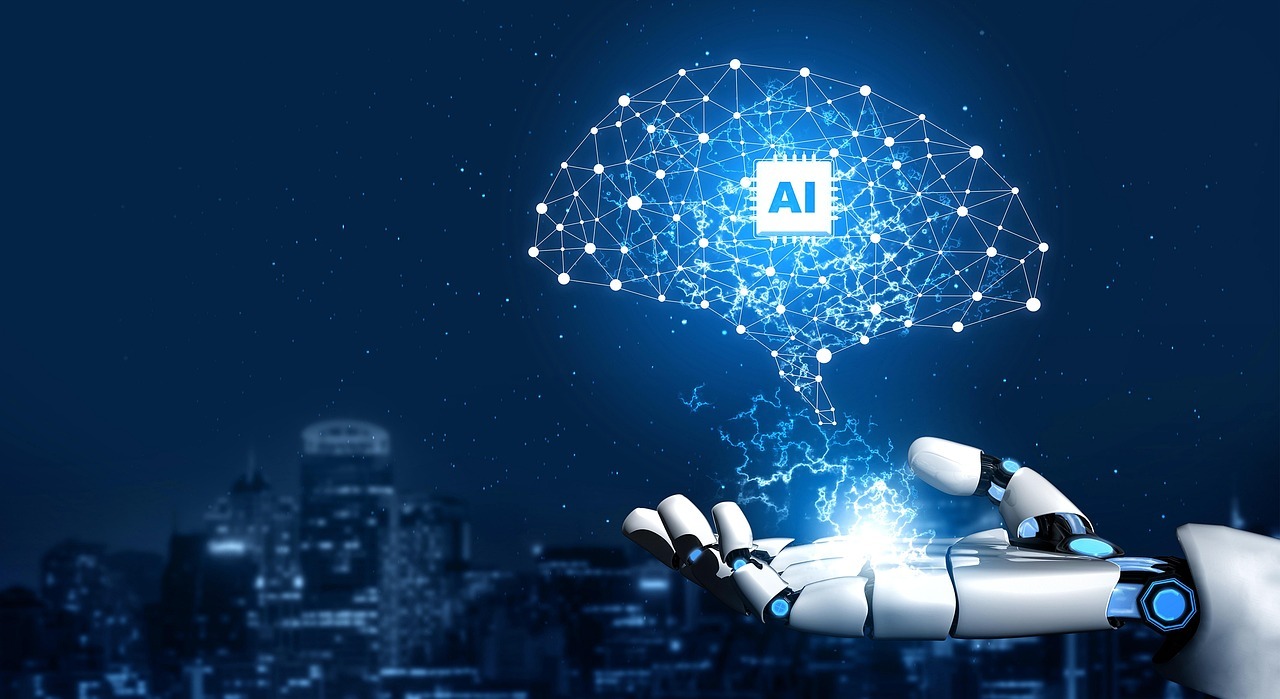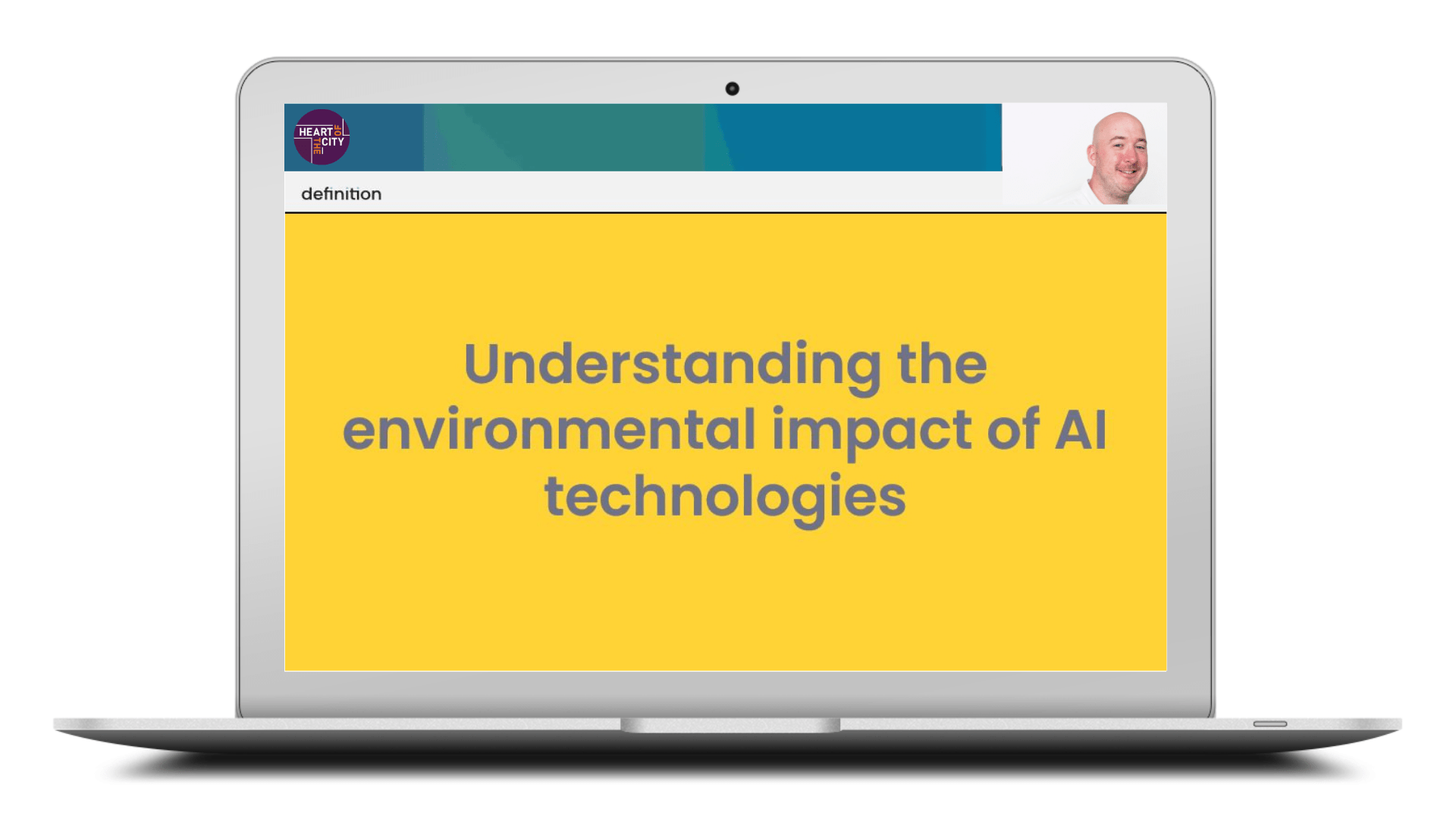For Heart of the City’s first Lunch and Learn of the year, we invited Luke Budka, AI Director at Definition, to explore how to incorporate AI ethically and sustainably into the workplace. The session, Adopting AI Responsibly in the Workplace, was designed to equip professionals and decision-makers with the knowledge and tools to embrace AI responsibly while fostering trust, transparency, and sustainability.
Adopting AI Responsibly in the Workplace

As AI continues to reshape industries, businesses, especially small and medium enterprises (SMEs), must navigate its integration responsibly. This means balancing efficiency with ethical data privacy, addressing employee concerns, and adopting AI in a way that is both cost-effective and environmentally conscious.
Here are the key highlights from the workshop, along with useful resources and best practices from Luke on making AI use more sustainable and efficient.
AI adoption can significantly improve workplace productivity, but not all employees use AI the same way.
A Harvard Business School/Boston Consulting Group (BCG) study found that employees fall into two categories:
- “Centaur” users, who apply AI selectively for specific tasks while using human judgment for the rest.
- “Cyborg” users, who take an AI-first approach and rely heavily on automation.
The study also revealed that, even without training, AI benefits lower-performing employees the most—boosting their productivity by 43%—while high performers saw a 17% gain. So, what is the takeaway for SMEs? Widespread, secure deployment, results in almost immediate gains.
With tools like ChatGPT, Gemini, and Copilot easily accessible, many employees are using AI without employer approval—a phenomenon known as Shadow AI.
A survey of 6,000 knowledge workers (US, UK, Germany) found:
- 50% were using non-company issued AI tools at work.
- 70% were aware of the risks but continued using AI tools anyway.
- 46% wouldn’t give it up, even if it were banned.
This presents serious data privacy concerns. Employees may unintentionally input sensitive company information into AI systems, which some providers use to train their models.
What should businesses take away from this information?
- Audit AI usage in the workplace. Employees may already be using AI tools without awareness of the risks.
- Provide access to secure AI solutions, such as business versions of ChatGPT or custom private AI environments that protect data.
- Educate employees on AI terms and conditions – many free tools default to data collection unless users opt out.
By following these simple strategies, businesses can reduce costs, improve AI efficiency, and minimise environmental impact:
- Master prompt engineering – Writing clear, precise prompts reduces trial-and-error, saving time and computing power.
- Use smaller AI models when possible – Not every task needs a high-powered model; choose the right-sized AI for cost and energy efficiency.
- Share your best prompts with your team – Avoid redundant work by building a shared library of effective AI prompts.
- Lower reasoning depth for simple tasks – If using a reasoning model, adjust settings to reduce unnecessary computation.
- Opt for shorter context windows – Long memory increases computing needs; use a smaller window when possible to cut energy use.
So what’s the bottom Line? By making small adjustments, businesses can reduce costs and carbon impact while still leveraging AI’s benefits.
AI is already reshaping workplace culture and job roles, with companies like Klarna reducing staff while paying remaining employees more.
Klarna’s AI impact has caused the workforce to reduce from 5,000 to 3,800, and their revenue per employee has increased by 73% due to AI efficiency.
Employees with AI expertise are now earning higher salaries. They are also actively learning AI to stay competitive. 47% of AI users (in the shadow AI survey mentioned above) said they wouldn’t stop—even if AI was banned—because they believe it will help them advance their careers.
What should businesses take away from this information?
- Invest in AI training – only 25% of workers have been trained (according to Adecco), yet demand for AI skills is growing.
- Support AI upskilling to boost both productivity and employee retention.
- Encourage knowledge-sharing through workshops, internal training, or AI “prompting parties” (like those hosted by PWC).
- AI offers immense opportunities but must be adopted thoughtfully. Business leaders should focus on:
- Balancing AI-driven efficiency with ethical data privacy.
- Providing secure AI access to avoid Shadow AI risks.
- Reducing AI’s carbon footprint through smarter usage.
- Experiment with AI tools securely (Definition offers organisations access to secure AI demo environments where they can experiment safely)
- Audit your team’s AI usage and create policies.
- Invest in employee AI training.
- Follow sustainable AI practices to reduce costs and emissions.
- Stay informed on AI regulations and best practices.
In this recording of our Lunch and Learn ‘Adopting AI Responsibly in the Workplace’, Luke Budka shares how to equip professionals and decision-makers with the knowledge and tools to embrace AI responsibly while fostering trust, transparency, and sustainability.
Click here to watch the full Lunch and Learn on our YouTube page.






